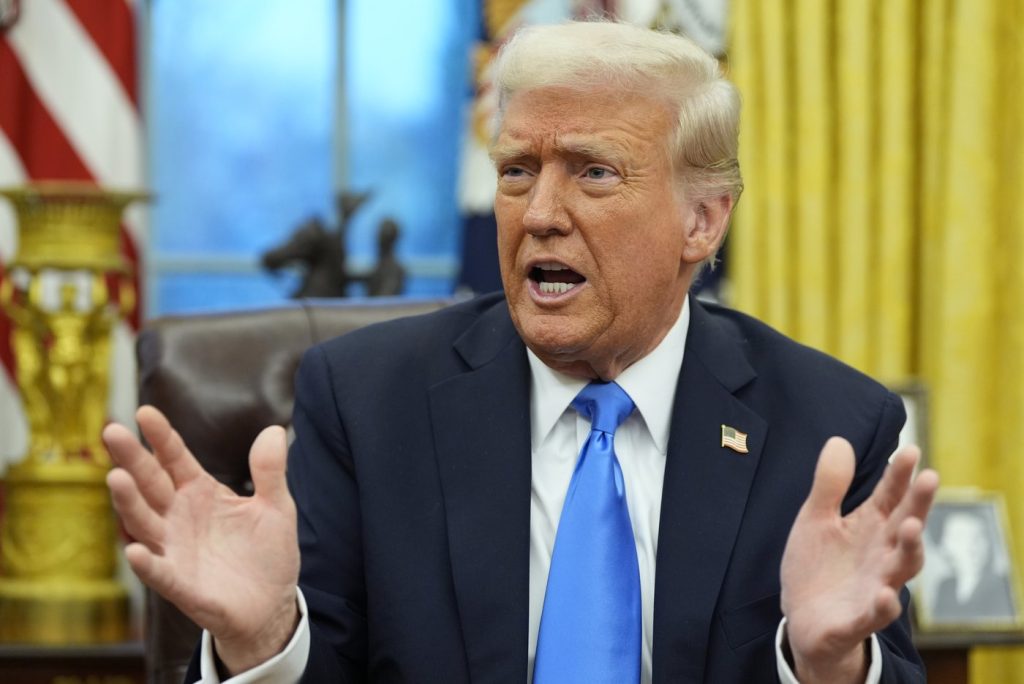BANGKOK (AP) - Recent comments and policy shifts by U.S. President Donald Trump regarding Ukraine have raised concerns among experts about potential implications for Taiwan and its relationship with China. Following three years of established American support for Ukraine, Trump's abrupt reversal in stance has sparked worries that Beijing might feel emboldened in its territorial claims over Taiwan. Nevertheless, analysts suggest that China is more likely to adopt a cautious approach as it observes the unfolding situation in Europe.
In the last two weeks, Trump has made several controversial statements regarding Ukraine, including falsely suggesting that Ukraine initiated the war and that the country may "be Russian someday." He also questioned the legitimacy of President Volodymyr Zelenskyy's government and diverged from the longstanding American policy of isolating Russia, initiating direct discussions with Moscow that echo Kremlin narratives.
Prior to his meeting with Trump in Washington on Monday, French President Emmanuel Macron expressed the necessity of strong opposition to President Putin. He emphasized that the U.S. must maintain a credible stance in the face of China's assertiveness, stating, "How can you, then, be credible in the face of China if you’re weak in the face of Putin?"
The relationship between Ukraine and Taiwan is rooted in their respective territorial disputes. Just as Moscow claims Ukraine as historically Russian territory, China asserts sovereignty over Taiwan, threatening to use force if necessary. Trump's apparent softening of rhetoric regarding Ukraine has led to concerns in Taiwan about U.S. reliability in the face of a potential Chinese military incursion.
Despite Trump's recent comments, experts like Russell Hsiao, executive director of the Global Taiwan Institute in Washington, caution that Beijing is likely taking a measured stance. Hsiao remarked, "I don’t think Xi Jinping will be so brash as to roll the iron die on the conclusion that just because Trump acted in a certain way concerning Ukraine he would do the same over Taiwan. Trump is too unpredictable."
Trump's administration has exhibited fluctuating policies regarding Taiwan. Upon leaving office in 2021, Trump was regarded as a favorable figure in Taiwan, credited with strengthening U.S.-Taiwan relations. By law, the U.S. is required to provide Taiwan with sufficient defense support to deter mainland invasion but maintains a policy of "strategic ambiguity" concerning direct military intervention.
Recently, however, Trump has criticized Taiwan, suggesting it should financially contribute to its defense and has accused it of undermining U.S. semiconductor production. Despite these criticisms, Trump has appointed several "China hawks" to prominent positions within his administration, such as Secretary of State Marco Rubio and Defense Secretary Pete Hegseth, indicating a complicated stance on China.
After meetings in Brussels, Hegseth highlighted that reducing U.S. support for Ukraine would enable a more focused strategy on the Asia-Pacific region, suggesting a shift in U.S. priorities. Additionally, Rubio underscored the importance of maintaining stability across the Taiwan Strait as vital for broader international security.
China closely monitors the evolving U.S. position and may read Trump's modification of Ukraine policy as an opportunity to frame the U.S. as an unreliable ally. Experts like Meia Nouwens of the International Institute for Strategic Studies note that while this situation may embolden China's rhetoric, it does not necessarily signal an impending change in its approach to Taiwan.
While there were earlier concerns that Trump's administration might appear favorable to China, he ultimately adopted a more confrontational approach. Analysts propose that the current shift in U.S. focus away from Ukraine could be interpreted as an attempt to free resources to address the growing challenge posed by China, although this strategy carries significant risks.
In summary, the ongoing developments in Ukraine and their effect on U.S.-Taiwan relations highlight the intricate dynamics at play in international diplomacy, where each move is carefully watched by global actors navigating their own interests.











